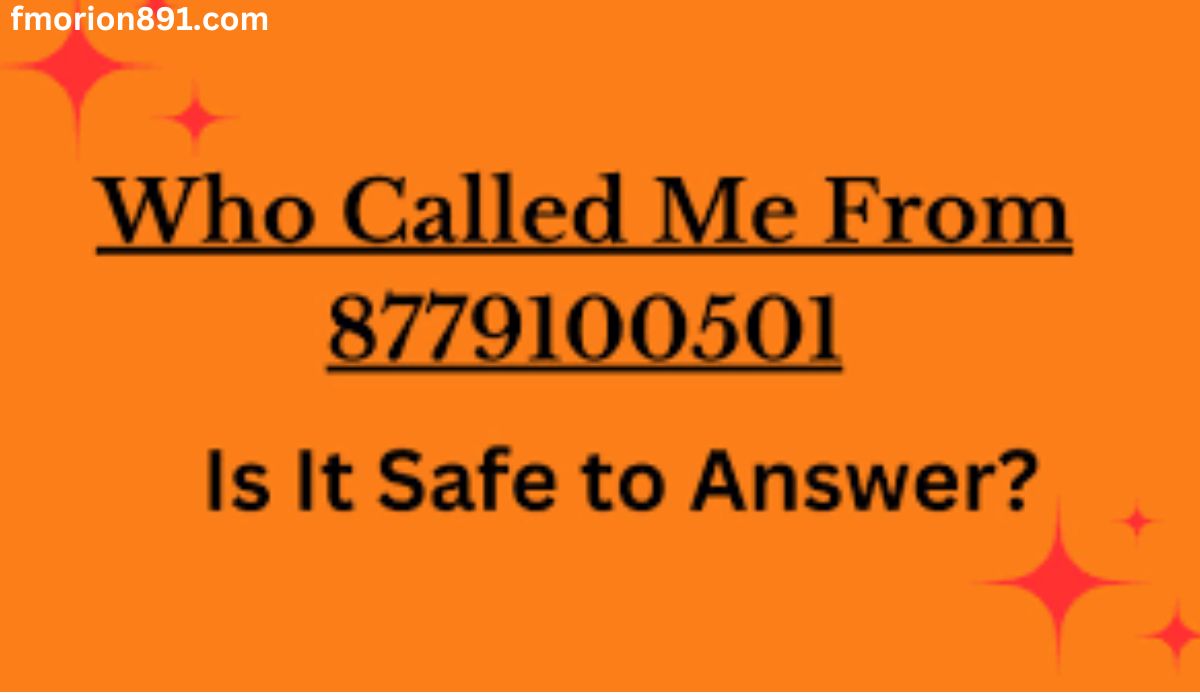Introduction
Imagine sitting down to dinner with your family when your phone rings. You glance at the caller ID, and it displays a number you don’t recognize—8779100501. Frustrated by yet another interruption, you wonder who could be calling. Unwanted calls like these have become increasingly common, and they often carry potential risks. This article will explore the dangers associated with the phone number 8779100501, offering insights into who might be calling, the types of scams to watch out for, and how you can protect yourself from falling victim to these calls.
Identifying the Caller
Caller ID Information
The first step in understanding who is behind the number 8779100501 is to consider the area code. The number begins with an 877 area code, which is a toll-free code commonly used by businesses and organizations across the United States. While toll-free numbers are often legitimate, they are also frequently used by telemarketers, debt collectors, and scammers who aim to make their calls appear official.
Reverse Phone Lookup
To further investigate the source of the call, a reverse phone lookup can be a helpful tool. By entering 8779100501 into a reverse lookup service, you can obtain more information about the caller, such as their name, location, and any user-reported experiences. Many online platforms offer reverse phone lookup services, some of which are free while others may require payment for detailed reports. This step can be crucial in determining whether the call is from a reputable source or a potential scam.
Online Reviews and Reports
Another effective way to gather information about 8779100501 is by checking online forums and databases where users share their experiences with specific phone numbers. Websites like WhoCallsMe and 800Notes are excellent resources for finding user-generated reports. If you see multiple complaints or warnings associated with 8779100501, it’s a strong indication that the number might be linked to scams or nuisance calls.
Types of Scams and Nuisance Calls
Telemarketing
Telemarketing is a common use of toll-free numbers like 8779100501. While not all telemarketing calls are scams, they can be annoying and sometimes misleading. Telemarketers may use aggressive sales tactics, trying to persuade you to buy products, donate to charities, or sign up for services you don’t need. In some cases, telemarketing calls can be a front for more serious scams, so it’s important to be cautious.
Debt Collection
Another scenario in which you might receive a call from 8779100501 is debt collection. Legitimate debt collectors have the right to contact you about outstanding debts, but scammers often pose as debt collectors to trick you into paying money you don’t owe. They might use threatening language, pressure you into making immediate payments, or even claim that legal action will be taken against you if you don’t comply. Always verify the legitimacy of the debt and the collector before making any payments.
Phishing
Phishing scams are designed to steal your personal information, such as credit card numbers, Social Security numbers, or online account credentials. Scammers using the number 8779100501 might pretend to be from a trusted organization, asking you to verify your identity or provide sensitive information. They often create a sense of urgency, making it seem like your account is at risk unless you comply immediately. Remember, legitimate companies will never ask for personal information over the phone without proper verification.
Robocalls
Robocalls are automated calls that deliver pre-recorded messages. While some robocalls are legitimate—such as those from your bank or healthcare provider—many are used for scams. Scammers using robocalls might claim to be from government agencies, tech support, or financial institutions, warning you of supposed issues that require immediate action. If you receive a robocall from 8779100501, it’s best to hang up without engaging.
Protecting Yourself from Scams
Do Not Call Registry
One of the simplest ways to reduce unwanted calls is by registering your phone number on the National Do Not Call Registry. This free service is designed to block most telemarketing calls, though it won’t stop scammers who disregard the rules. While the registry isn’t foolproof, it can significantly reduce the number of nuisance calls you receive. You can register online or by calling the registry directly.
Caller ID Spoofing
Caller ID spoofing is a technique used by scammers to make their calls appear as though they are coming from a legitimate source. This means that even if you recognize the area code or the number seems familiar, it might still be a scam. To protect yourself, avoid answering calls from unknown numbers, and if you do answer, never provide personal information unless you are certain of the caller’s identity. If a call from 8779100501 seems suspicious, hang up and verify the caller’s legitimacy through official channels.
Screening Calls
Screening your calls is an effective way to avoid scams. Let unknown numbers go to voicemail, and listen to the message before deciding whether to call back. Most legitimate callers will leave a message if it’s important, while scammers often will not. If the message from 8779100501 sounds suspicious or asks for sensitive information, it’s best to ignore it.
Hang Up on Suspicious Calls
If you answer a call from 8779100501 and the conversation feels off—whether due to aggressive tactics, requests for personal information, or strange questions—hang up immediately. Do not engage with the caller or provide any information. Trust your instincts; if something doesn’t seem right, it probably isn’t.
Reporting Scams and Nuisance Calls
Federal Trade Commission (FTC)
The Federal Trade Commission (FTC) is the primary agency responsible for protecting consumers from fraud and scams. If you receive a scam call from 8779100501, you can report it to the FTC. Your report helps the agency track down scammers and take action to prevent them from targeting others. The FTC also provides resources and tips on how to avoid scams, making it a valuable tool for consumers.
State Attorney General’s Office
Each state has an Attorney General’s Office that deals with consumer fraud. If you suspect that a call from 8779100501 is a scam, you can report it to your state’s Attorney General. These offices often have the authority to investigate and take legal action against scammers. Additionally, they can provide guidance on how to protect yourself from similar calls in the future.
Your Phone Carrier
Many phone carriers offer services to block unwanted calls, including those from numbers like 8779100501. These services may include call blocking, caller ID enhancements, or spam call warnings. Contact your carrier to explore the options available to you. By taking advantage of these tools, you can reduce the number of nuisance calls you receive and protect yourself from potential scams.
You May Also Like: The Truth Behind 321-218-2732: Is It a Scam?
Conclusion
Unwanted calls from numbers like 8779100501 can be more than just an annoyance—they can pose serious risks. By understanding how to identify potential scams, protecting yourself from unwanted calls, and knowing how to report them, you can significantly reduce your chances of falling victim to these schemes. Stay vigilant, trust your instincts, and take proactive steps to safeguard your personal information.
FAQs
1. What should I do if I receive a call from 8779100501?
If you receive a call from 8779100501, avoid answering if you don’t recognize the number. If you do answer, don’t share any personal information.
2. Is 8779100501 linked to scams?
Yes, 8779100501 has been reported in connection with telemarketing, debt collection scams, and phishing attempts. Exercise caution if contacted.
3. How can I block calls from 8779100501?
You can block calls from 8779100501 through your phone carrier’s blocking service or by using third-party apps designed to prevent unwanted calls.
4. Can I report 8779100501 to authorities?
Yes, you can report 8779100501 to the Federal Trade Commission (FTC) or your state’s Attorney General’s Office to help prevent others from being scammed.
5. What is reverse phone lookup and how can it help with 8779100501?
Reverse phone lookup allows you to find information about the caller, such as their name and location, helping you assess whether the call is legitimate.










